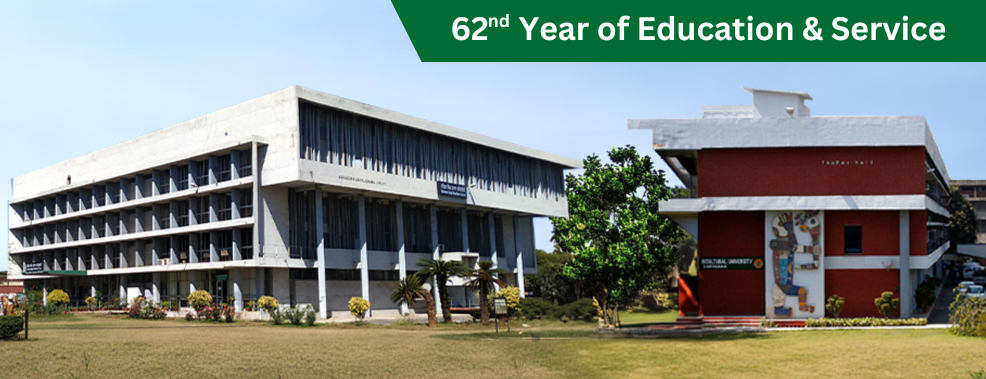62nd Year of Education & Service
College of Community Science / Resource Management and Consumer Science / Faculty
Name : |
Dr Deepika Bisht |
Designation : |
Scientist |
Office Phone : |
0161-2401960 ext. 264 |
Mobile : |
9501824822 |
Email (Office) : |
deepikabisht@pau.edu |
Research Areas : |
-- |
Researcher ID's : |
-- |

College of Community Science / Resource Management and Consumer Science / Home
The Department of Resource Management and Consumer Science was set up in 1970. Initially it was named as Home Management and the nomenclature was changed to Family Resource Management in the year 1998 and Resource Management & Consumer Science in 2023. Since its inception, the department is performing the diversified role of teaching, research and extension. Initially, department was offering courses to B.Sc. 5 year programme, B.Sc. 3 year programme, and also to students of one year Certificate course in Farm Women Training Programme. M.Sc. programme was started in the year 1970 and Ph.D. programme in the department was started in 1978 and again revived in 1991. The department also initiated B.Sc. (Hons) Interior Design (4 Year Programme) in the academic year 2014-15. However, it has been discontinued from the year 2017-18. Presently, the department is offering courses to the under-graduate students under 3+1 stream in which courses were reframed to give more of practical experience to the elective students. The department has established an Experiential learning unit in artistic creations for imparting hands-on-training to students in production management and marketing strategies for entrepreneurial skill development. The department offers specialization in Ergonomics and Resource Management at PG level. Till date, around 218 M.Sc. students and 37 Ph.D. students have completed their degrees successfully. The major research areas of the department are: Ergonomics, Resource conservation, Family environment, Work simplification, Work station designing, Household equipment, Consumer behaviour, Green consumerism, Geriatrics, Housing and space designing, Interior decoration and management of various family resources.
The faculty of the department has completed 6 research projects as Principal Investigator. At present, the department is running All India Coordinated Research Project on Women in Agriculture sponsored by ICAR since 1980. The project aims to develop, test and refine the tools/technologies for drudgery reduction of farm women in agriculture and allied sectors.
Important extension activities of the department include exhibitions during Kisan melas, Food Craft mela, Organising and co-ordinating skill development trainings, demonstrations, awareness campaigns and motivational lectures on consumer education, artistic use of paddy straw, surface decoration techniques for Pottery, Lamasa Art and Decoupage etc., Use and care of solar gadgets and short training courses in care and maintenance of household tools/equipment. Besides this, faculty has also published a number of popular articles and delivered TV and Radio Talks related to various aspects of Family Resource Management.
At present, the department has faculty strength of one Professor, two Associate Professors and two Scientists. Faculty of the department is enriched with vast experience in teaching, research and extension. All the faculty members have acquired Ph. D. degrees and attended number of trainings and workshops at national and international level. These experiences have strengthened research methodologies for effective outcomes and opened new directions in research, especially in the field of ergonomics which is an effective way to reduce physiological stresses of workers; thus improving their health and quality of life.
College of Community Science / Resource Management and Consumer Science / Head of Department
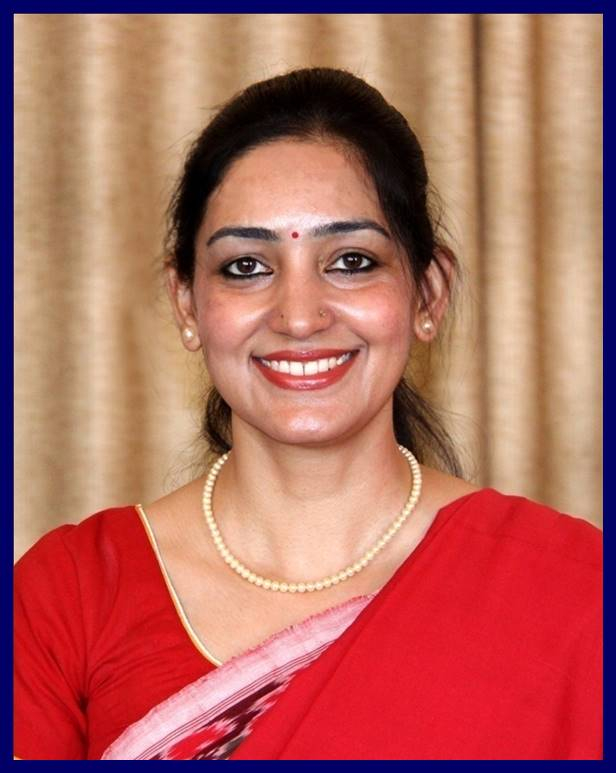
Name : Dr. Sharanbir Kaur Bal (Additional Charge)
Address : Department of Resource Management and Consumer Science
Office : 0161 -2403179, Ext-322
Phone : 98761-20830
E-Mail : hodfrm@pau.edu
Brief Introduction
College of Community Science / Resource Management and Consumer Science / Thrust Areas
- Resource Management
- Consumer Education
- Ergonomics
- Household Equipment
- House and Its Interiors
- Women and Environment
College of Community Science / Resource Management and Consumer Science / Faculty
Faculty
| S.No | Name & Designation | E-Mail/Telephone |
| 1. | Dr Deepika Bisht Scientist |
deepikabisht@pau.edu 9501824822 |
| 2. | Dr Harpinder Kaur Professor |
harp_07@pau.edu 098159-81397 |
| 3. | Dr Ritu Gupta Associate Professor |
rgupta@pau.edu 098147-09921 |
| 4. | Dr Sharanbir Kaur Bal Professor |
balsharanbir@pau.edu 098761-20830 |
| 5. | Dr Shivani Rana Scientist |
shivanirana@pau.edu 9876343369 |
College of Community Science / Resource Management and Consumer Science / Faculty Distinctions
- Dr. M. K. Dhillon, won ICAR Award for Best Teacher in the year 1993-94.
- Dr. K. Oberoi, Unit Coordinator, AICRP, Won Chaudhary Devi Lal Memorial Best AICRP Award, 2003
- Dr. K. Oberoi was Visiting Fellow at M S University, Varodra, Gujrat.
- Drs. R. Gupta, R. Bakhshi, P. Sandhu and M Sidhu won Best Product Design Award in International Conference on Ergo 2012: Safety for All. Organized by College of Home Science, GB Pant University of Agriculture and Technology, Pantnagar, Uttarakhand, India.
- Dr. S. Sharma and Dr. K. Oberoi were awarded second best paper award for the research paper published in Indian Journal of Dairy Science from Indian Dairy Association, New Delhi during 43rdDairy Industry conference held at Kolkata from 19th-21stFeb. 2015
- Dr. Shivani Rana won Best Women Assistant Professor Award in recognition of outstanding contributions in the field of Agricultural Sciences in India by PEARL foundation during National conference on SMART SUMMIT -2016 at Madurai.
- A.S. Kumari, Dr. J.K. Gill, and A. Kumari received Award for Best Poster Presentation. In International Conference on Women's Work and Occupational Health-Emerging Challenges and Policy Measures in the Unorganized Sector (WWOH-2018) on ‘Occupational Stress Faced by Migrant Women Workers in Ludhiana City’ organized by Arya PG College, Panipat, Haryana in 2018.
- Ragini Dubey and Dr. Surinderjit Kaur received Award for Best Poster Presentation. In International Conference on Women's Work and Occupational Health-Emerging Challenges and Policy Measures in the Unorganized Sector (WWOH-2018) on ‘Hidden Risks of Synthetic Home Cleaners and Popularization of Green Cleansers for Safety and Well Being of Women Workers’ organized by Arya PG College, Panipat, Haryana in 2018.
- Dr. Deepika Bisht and Dr. Ritu Gupta won Best Paper Presentation Award for the research paper entitled “Comparative assessment of farm activities performed by women using conventional and improved methods in Punjab state” under the theme “Gender Issues at Farm Level” at an online National Workshop on Gender and Atmanirbhar Bharat in Agriculture” organized by Central Agricultural University, Imphal held from 15th to 17th October 2020.
College of Community Science / Resource Management and Consumer Science / Important Achievements
ERGONOMICS
- The ergonomically best combination of computer table and keyboard height of 73 and 68 cm respectively reduces musculo-skeletal and visual problems.
- An improved cotton boll picking bag with padded shoulder belts, padded lumber belt; in which knots were replaced by adjustable buttons; double-pronged cotton-boll plucker ( to protect fingers from injuries); cushioned shoes (to reduce feet fatigue) ; full sleeve shirt (to protect from scratches) reduce drudgery while cotton picking.
- The most functional height of working counters is 80 -85 cm (3 -5 inches below the elbow height of the worker), depth 50 - 60 cm. and width 150 - 172 cm. for performing cooking, dish-washing and preparation activities.
- Standing type kitchen should be preferred for wheelchair user females. A space at least 35 cm deep should be provided under all the work counters and the height of the work counter recommended as 70 cm from the ground level.
- Drudgery prone activities were identified in the food processing enterprises and tools were developed/modified to replace the strenuous manual task by mechanizing it or fitting the tool to the work. The tools designed were pulp extractor, vegetable multi-slicer, shell cracker and a shifting trolley.
- The use of 6 cm high rolling board for papad rolling reduces the spine deviation angle by 3.01 per cent resulting in improved work posture. It also helps in reducing grip fatigue (6-7%), pinch fatigue (79%) and back muscle fatigue (7.49%).
HOUSE AND ITS INTERIORS
- Broad leafed and succulent houseplants help in improving the quality of air (oxygen levels) during day time as well as with artificial light at night. They also help in reducing the noise levels inside the house.
- Upholstered sofa sets, lined cotton curtains and rugs/ carpets control up to 13 % of indoor noise pollution in comparison to room without furnishings.
- The CO2 concentration reduces from 275.33 ppm to 142.27 ppm by placing indoor plants in different areas of the house viz. living room, bedroom, kitchen and drawing room.
- Drying by embedding in silica gel is the best method for rose, carnation, helichrysum and fern for preparing various decorative articles.
- The most effective treatments for increasing vase-life of flowers such as :Roses and Gerbera - sugar + lemon + household bleach followed by sugar + household bleach
Carnations - sugar + household bleach followed by lemon+ household bleach
Gladiolus - sugar + household bleach followed by sugar + lemon + household bleach
GERIATRICS
- The various dimensions for comfortable working by elderly are suggested as: Table height = 72 cm, Seat height of easy chair = 33.5 cm , Seat width = 44.7 cm , Seat depth of easy chair = 52 cm , Maximum height of storage shelves = 151cm
- The effective Help Aids for Elderly are suggested as: A 67 cms high cushioned stool with lumbar support & foot rest to work on kitchen counter, a 46 cms high bathing stool with 20 cm diameter cut in center, 79 cms high rail support to get up from seated posture , 94 cms high climbing stick for climbing stairs, Hot water bottle holder.
CONSUMER EDUCATION
- Commercial and laboratory prepared (using mainly home available green ingredients) cleansers were compared in terms of their cleaning efficiency and cost effectiveness. The results indicated that the laboratory prepared cleansers were better than selected commercial cleansers in terms of selected quality parameters viz. pH range, surface tension, foam stability, BOD, emulsion stability and hard water test. These cleansers were found to be more efficient in removing stains from utensils and floor as compared to selected commercial cleansers. Laboratory prepared acidic cleanser was having pH 5.5 and basic cleanser had pH 9.5. Laboratory prepared acidic and basic floor cleansers lowered the surface tension up to 19.31 and 17.81 dyne cm-1 which was more than the selected commercial floor cleansers. Laboratory prepared cleansers are more eco-friendly as their BOD value was minimum i.e. 157 mg L-1 in acidic followed by basic cleansers 165.33 mg L-1 .
- Powder detergents play major role in chemical contamination of water, making it hard, saline and unfit for washing and drinking purposes. Hence, it is suggested to stop using powder detergents and start using eco-friendly liquid detergents to save resources, minimize water pollution and to protect our health.
- Water was found to be the main adulterant in all the milk samples. SNF values in different milk samples were found to be significantly lower than the recommended value.
HOUSEHOLD EQUIPMENT
- Stainless steel and glass containers are recommended for storage of food in refrigerators to minimize bacterial and mold count.
- The use of double pot smokeless chulha saves fuel (30%) and time (40%).
- The appropriate use of time & labour saving devices and equipment increases 30 - 40 percent efficiency in the kitchen work.
- Long handled brooms and mops help in reduction of postural variation (47 - 68 %), are time saving (29%) and improve quality of work.
RESOURCE MANAGEMENT
- The best option for dehydration of fenugreek is solar drying because of its efficiency, cost and acceptability.
- Intensive training of farm families for goal setting enable them to achieve the goals successfully.
- Alignment of homemakers with the change agents will activate their self realisation for learning management skills and help them in chanellizing their dormant potentials.
TECHNOLOGIES DEVELOPED/TESTED UNDER AICRP-FRM COMPONENT
- The Sapling Carry Basket of light weight plastic material, having adjustable straps helps in carrying the saplings of vegetables and flowers efficiently. It can be used with the hand operated sapling transplanter. It reduces the frequency of bending and picking saplings. There is reduction in energy expenditure (5.22%), physiological cost of work (12%) and work output increases by 15 percent.
- The Ring Cutter is used for plucking of vegetables especially cucubates family like Ghia, Tori and Tar. The blades are made of high carbon steel and aluminium is used for the ring part. The diameter of the ring cutter is 2 cms and length of blade is 2.5 inches. Ring cutter is highly efficient for sharp, smooth and safe vegetable harvesting. It is of low in cost, light in weight and has adjustable ring size. With the use of ring cutter there is reduction in energy expenditure (1.90%), physiological cost of work (20%) and grip fatigue (5.20%). The work output increases by 20 percent.
- Flower Harvesting Bag is developed by using water proof parachute material. It has adjustable straps to fit any user and zip at the bottom of the pocket to unload the flowers easily. With the use of flower harvesting bag there is reduction in energy expenditure (12.2%), physiological cost of work (16%), grip fatigue (22%) and work output increased by 15 percent.
- The Ergonomic Low Working Table is rectangular in shape and is made of stainless steel to prevent any rusting. It has got four rollers for easy movement. The table is very useful for the workers of small scale food processing units. For fine work the table is kept at 15 inches height and if the work requires some force, then the height can be lowered to 5 inches.It reduces drudgery and musculoskeletal disorders of the workers.
- A bag for vegetable harvesting with adjustable belts around neck and waist; use of net for ventilation, front pocket to keep harvesting tool, zipper on both sides of the bag for easy unloading is suitable for harvesting vegetables like brinjal, chillies , okra and vine crops such as bottle gourd, ridge gourd and bitter gourd. It reduces the musculoskeletal pains of the workers during vegetable harvesting ( shoulder pain – 29.26 %), Lower back – 25 %, Wrist- 47.5 %). Reduction in energy expenditure was found to be 19.45 % and physiological cost of work (38.13 %). It is suitable for picking fruits also.
College of Community Science / Resource Management and Consumer Science / Current Projects
| Sr. No. | Ongoing Project | Teacher Associated |
| 1. | All India Coordinated Research Project on Women in Agriculture entitled "Identification of gender gaps by assessing vulnerability indices for climate change and approaches to minimize occupational drudgery through technological interventions". | Dr. Shivani Rana, Scientist, FRM |
College of Community Science / Resource Management and Consumer Science / Important Publications
- Bal, S.K., Gupta, R. and Bisht, D. (2023). Drudgery Reduction of Farm Women Through Technology Intervention. J Community Mobilization and Sustainable Development, 18(2): 652-656. (NAAS rating- 5.67)
- Bisht, D., Martolia, D. and Bal, S.K. (2023). Buying practices followed by homemakers of Ludhiana city. J Community Mobilization and Sustainable Development. 18(2): 565-572. (NAAS rating- 5.67)
- Martolia, D and Bisht, D (2023) Stress experienced during COVID 19 pandemic and coping strategies sought by homemakers of Ludhiana. J Community Mobilization and Sustainable Development. 18(2): 529-534. (NAAS rating- 5.67)
- Rana S and Kaur K (2023). Self Help Group: A Ray of Hope in Challenging Times. J Community Mobilization and Sustainable Development. 18(1): 304-308. (NAAS rating- 5.67)
- Gupta, S. and Kaur, H. (2023). Occupational Risk Analysis while Performing Polyhouse activities in Ludhiana. Int. J Edu and Mgt, 13(1): 33-37. (NAAS rating- 4.68)
- Martolia, D. and Gupta, R. (2023). Environmental and Ergonomic Risk Factors of Professional Gardeners. J Krishi Vigyan, 11(2): 101-105. (NAAS rating-4.55)
- Mahorana, G. and Gupta, R. (2022). Assessment of Occupational Stress of Teaching Professionals during Covid 19 Pandemic. J Krishi Vigyan, 10(2): 12-17. (NAAS rating-4.55)
- Martolia, D. and Gupta, R. (2022). Exposure to Work related Risk factors Experienced by Gardeners. J. Community Mobilization and Sustainable Development, 3(Seminar Special Issue): 782-786. (NAAS rating-5.67)
- Gupta, S. and Kaur, H. (2022). Assessment of Musculoskeletal Problems of Polyhouse Workers through Subjective Analysis Technique. J Community Mobilization and Sustainable Development 17(4): 1181-86. (NAAS rating- 5.67)
- Kaur K and Rana S (2022) Impact of vocational training on knowledge of rural women regarding preservation of fruits and vegetables. J Community Mobilization and Sustainable Development. 17(4): 1362-1366. (NAAS rating- 5.67)
- Bal, SK; Bisht, D; Kaur, S and Singh, G (2022) Cultivation of Indigenous Vegetables in Containers Through Roof Based Gardening. J Community Mobilization and Sustainable Development, 17(1): 333-340. (NAAS rating- 5.67)
- Gupta S and Kaur H (2022) Workplace Facilities: A Correlated Parameter of satisfaction of Polyhouse workers of Ludhiana District. J Community Mobilization and Sustainable Development. 17(2):609-14. (NAAS rating- 5.67)
- Martolia, D and Gupta, R (2022). Exposure to work related risk factors experienced by gardeners. J Community Mobilization and Sustainable Development 3(Seminar Special Issue):782-786 (NAAS rating- 5.67)
- Gupta, S and Kaur, H (2021) Job Profile and Satisfaction Level of Different Workers of Ludhiana. J Community Mobilization and Sustainable Development 17(2):1-5. (NAAS rating- 5.67)
- Martolia, D, Gupta, R and Kaur, H (2021). Ergonomic Analysis of Working Posture of Gardeners engaged in selected Gardening Activities. Indian Journal of Extension Education. 57(3): 211-214. (NAAS rating- 5.95)
- Sati, K; Bal, SK and Kaur, H (2021) Health Risk Assessment of workers Engaged in Flour Mills. J Community Mobilization and Sustainable Development. 17(2):407-12. (NAAS rating- 5.67)
- Gupta, R and Bisht, D (2020) Interventions to reduce drudgery of workers involved in small scale food processing units.J Community Mobilization and Sustainable Development, 15(3): 555-558. (NAAS rating- 5.67)
- Bisht, D; Gupta, R and Bal, S.K (2020) Ergonomic Issues Among Indian Children due to Increased Screen time from Online Classes During COVID-19 Pandemic.J Community Mobilization and Sustainable Development, 15(3): 694-703.(NAAS rating- 5.67)
- Martolia, D; Kaur, N and Bal, S. K (2020) Participation of farm women in value addition of farm produce and constraints faced by them.J Community Mobilization and Sustainable Development, 15(1): 207-210.(NAAS rating- 5.67)
- Martolia, D and Gupta, R (2020) Assessment of changing consumer behavior in the wake of Covid 19.J Community Mobilization and Sustainable Development. 15(2) : 359-363.(NAAS rating- 5.67)
College of Community Science / Resource Management and Consumer Science / Academic Programs
M.Sc. / Ph.D. Family Resource Management
M.Sc. courses approved under BSMA (2022)
| Sr. No. | Course no. | Course title | Cr. hrs |
| 1. | RMCS-501* | Resource Management: Principles and Practices | 3 (3+0) |
| 2. | RMCS-502* | Human Factors and Ergonomics | 3 (2+1) |
| 3. | RMCS-503* | Interior Space Planning | 3 (1+2) |
| 4. | RMCS-504* | Consumer Economics | 3 (2+1) |
| 5. | RMCS-505 | Work and Work Station Design | 3 (2+1) |
| 6. | RMCS-506 | Colour and Lighting in Interiors | 3 (2+1) |
| 7. | RMCS-507 | Consumer Issues and Legislations | 2 (2+0) |
| 8. | RMCS-508 | Product Design | 3 (1+2) |
| 9. | RMCS-509 | Ergonomic Research Techniques | 3 (1+2) |
| 10. | RMCS-510 | Housing and Energy Efficient Building Design (in collaboration with Dept of Civil Engineering) | 3 (2+1) |
| 11. | RMCS-511 | Technical Drawings | 3(1+2) |
| 12. | RMCS-512 | Interior Design Business Management | 3(1+2) |
| 13. | RMCS-513 | Environmental Resource Management | 2(1+1) |
| 14. | RMCS-514 | Special Project | 2(0+2) |
| 15. | RMCS-591 | Seminar | 1(1+0) |
| RMCS-600 | Master's Research | 30 |
M.Sc. Courses before BSMA
| Sr. No. | Course no. | Course title | Cr. hrs |
| 1. | FRM 501 | Approaches to Resource Management | 2+0 |
| 2. | FRM 502 | Housing and Interior Space Designing | 3+1 |
| 3. | FRM 503 | Empowerment of Families as Consumers | 2+0 |
| 4. | FRM 504 | Consumer Ergonomics | 2+1 |
| 5. | FRM 505 | Energy Conservation in Building Design(In collaboration with Deptt. of Civil Engineering) | 2+1 |
| 6. | FRM 507 | Colour and Lighting in Interiors | 2+1 |
| 7. | FRM 509 | Consumer Guidance and Counselling | 2+1 |
| 8. | FRM 591 | Seminar | 1+0 |
| FRM 600 | Master's Research |
Ph.D. Courses approved under BSMA (2023)
| Sr. No. | Course no. | Course title | Cr. hrs |
| 1. | RMCS-601* | Trends in Resource Management | 3 (3+0) |
| 2. | RMCS-602* | Occupational Biomechanics | 3 (2+1) |
| 3. | RMCS-603 | Globalization and Consumer Economics | 3 (2+1) |
| 4. | RMCS-604 | Space Designing and Managerial Dimensions for Special needs | 3 (1+2) |
| 5. | RMCS-605 | Physical Ergonomics | 3 (1+2) |
| 6. | RMCS-606 | Environmental Issues and Challenges | 2 (2+0) |
| 7. | RMCS-607 | Family Dynamics and Women Power | 3(2+1) |
| 8. | RMCS-608 | Special Project | 2(0+2) |
| 9. | RMCS-691 | Seminar I | 1 (1+0) |
| 10. | RMCS-692 | Seminar II | 1 (1+0) |
| 11. | RMCS-699 | Doctoral Research | 75 |
* Core Courses
Ph.D. Courses before BSMA
| Sr. No. | Course no. | Course title | Cr. hrs |
| 1. | FRM 601 | Management of Family Environment | 2+0 |
| 2. | FRM 602 | Occupational Biomechanics | 2+1 |
| 3. | FRM 603 | Globalization and Consumer Economics | 2+0 |
| 4. | FRM 606 | Environmental Issues and Challenges | 2+0 |
| 5. | FRM 607 | Managerial Dimensions for Special Groups | 2+1 |
| 6. | FRM 591 | Seminar | 1+0 |
| FRM 700 | Ph.D. Research |
College of Community Science / Resource Management and Consumer Science / Facilities & Services
| 1. | HOUSEHOLD EQUIPMENT LABORATORY | 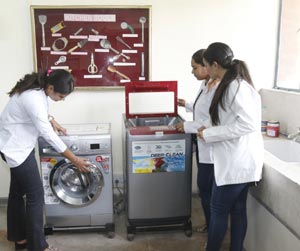 |
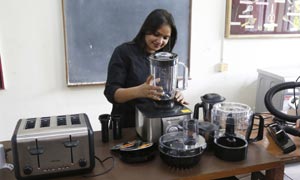 |
| 2. | FINE ARTS LABORATORY | 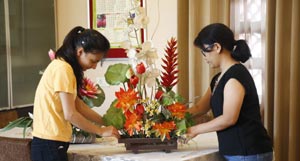 |
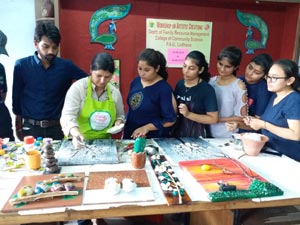 |
| 3. | FURNISHING LABORATORY | 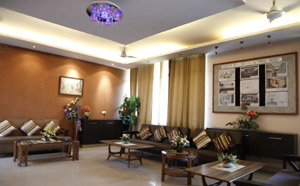 |
|
| 4. | MODULAR KITCHEN | 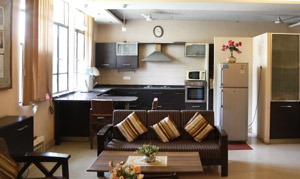 |
|
| 5. | RESEARCH LABORATORY | 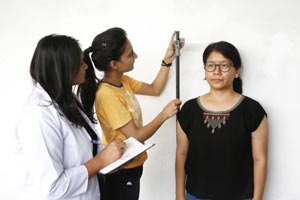 |
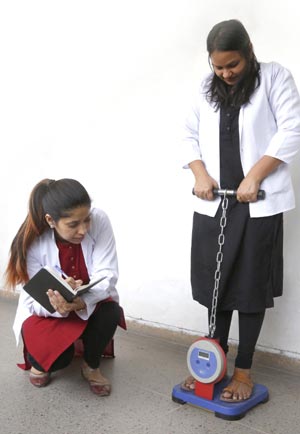 |
| 6. | EXPERIENTIAL LEARNING UNIT | 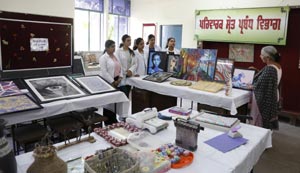 |
 |
College of Community Science / Resource Management and Consumer Science / PG Students
| M.Sc. Students | |||
| Sr. No. | NAME OF THE STUDENT | NAME OF THE MAJOR ADVISOR | THESIS TITLE |
| 1. |
Ediga Supriya L-2021-CS-321-M |
Dr. Harpinder Kaur | RETIREMENT FINANCIAL PLANNING BEHAVIOUR OF WORKING WOMEN OF LUDHIANA CITY. |
| 2. |
Komalpreet Kaur L-2022-CS-249-M |
Dr.Ritu Gupta | ASSESSMENT OF OCCUPATIONAL HEALTH HAZARDS AMONG WORKERS ENGAGED IN CANDLE MANUFACTURING UNITS. |
| Ph.D. Students | |||
| Sr. No. | NAME OF THE STUDENT | NAME OF THE MAJOR ADVISOR | THESIS TITLE |
| 1. |
Gayatri Mohrana L-2020-CS-160-D |
Dr. Sharanbir Kaur Bal | ERGONOMIC ASSESSMENT OF SELECTED TURMERIC CULTIVATION ACTIVITIES PERFORMED BY WOMEN OF PUNJAB AND ODISHA |
| 2. |
Khumukcham Jenita L-2022-CS-118-D |
Dr. Harpinder Kaur | ASSESSMENT OF ERGONOMIC STRESSORS FACED BY WORKERS WHILE PERFORMING MANGO HARVESTING PROCESS |






